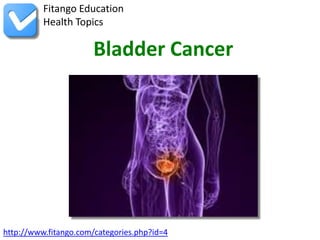
Bladder Cancer
- 1. Fitango Education Health Topics Bladder Cancer http://www.fitango.com/categories.php?id=4
- 2. Overview Cancer that forms in tissues of the bladder (the organ that stores urine). Most bladder cancers are transitional cell carcinomas (cancer that begins in cells that normally make up the inner lining of the bladder). Other types include squamous cell carcinoma (cancer that begins in thin, flat cells) and adenocarcinoma (cancer that begins in cells that make and release mucus and other fluids). The cells that form squamous cell carcinoma and adenocarcinoma develop in the inner lining of the bladder http://www.fitango.com/categories.php?id=4 1
- 3. Symptoms -- Finding blood in your urine (which may make the urine look rusty or darker red) -- Feeling an urgent need to empty your bladder -- Having to empty your bladder more often than you used to http://www.fitango.com/categories.php?id=4 2
- 4. Symptoms -- Feeling the need to empty your bladder without results -- Needing to strain (bear down) when you empty your bladder -- Feeling pain when you empty your bladder http://www.fitango.com/categories.php?id=4 3
- 5. Symptoms These symptoms may be caused by bladder cancer or by other health problems, such as an infection. People with these symptoms should tell their doctor so that problems can be diagnosed and treated as early as possible. National Cancer Insititute http://www.fitango.com/categories.php?id=4 4
- 6. Diagnosis If you have symptoms that suggest bladder cancer, your doctor will try to find out what’s causing the problems. You may have a physical exam. Also, you may have one or more of the following tests: http://www.fitango.com/categories.php?id=4 5
- 7. Diagnosis -- Urine tests: The lab checks your urine for blood, cancer cells, and other signs of disease. -- Cystoscopy: Your doctor uses a thin, lighted tube (a cystoscope) to look directly into your bladder. It may be done at your doctor’s office. This test can be uncomfortable because the doctor will insert the cystoscope into the bladder through your urethra. You may need local anesthesia for this test. http://www.fitango.com/categories.php?id=4 6
- 8. Diagnosis -- Biopsy: Your doctor can remove samples of tissue with the cystoscope. A pathologist then examines the tissue under a microscope. The removal of tissue to look for cancer cells is called a biopsy. In most cases, a biopsy is the only sure way to tell whether cancer is present. http://www.fitango.com/categories.php?id=4 7
- 9. Diagnosis For a small number of patients, the doctor removes the entire area with cancer during the biopsy. For these patients, bladder cancer is diagnosed and treated at the same time. http://www.fitango.com/categories.php?id=4 8
- 10. Diagnosis If cancer cells are found in the tissue sample from the bladder, the pathologist studies the sample under a microscope to learn the grade of the tumor. The grade tells how much the tumor tissue differs from normal bladder tissue. It may suggest how fast the tumor is likely to grow. http://www.fitango.com/categories.php?id=4 9
- 11. Diagnosis Tumors with higher grades tend to grow faster than those with lower grades. They are also more likely to spread. Doctors use tumor grade along with other factors to suggest treatment options. You may want to ask the doctor these questions before having a biopsy: -- Why do I need a biopsy? http://www.fitango.com/categories.php?id=4 10
- 12. Diagnosis -- How long will it take? Will I be awake? Will it hurt? -- What are the chances of infection or bleeding after the biopsy? Are there any other risks? -- How soon will I know the results? How do I get a copy of the pathology report? http://www.fitango.com/categories.php?id=4 11
- 13. Diagnosis -- If I do have cancer, who will talk with me about treatment? When? National Cancer Institute http://www.fitango.com/categories.php?id=4 12
- 14. Treatment Treatment options for people with bladder cancer are surgery, chemotherapy, biological therapy, and radiation therapy. You may receive more than one type of treatment. http://www.fitango.com/categories.php?id=4 13
- 15. Risks When you get a diagnosis of bladder cancer, it’s natural to wonder what may have caused the disease. Doctors can’t always explain why one person gets bladder cancer and another doesn’t. http://www.fitango.com/categories.php?id=4 14
- 16. Risks However, we do know that people with certain risk factors may be more likely than others to develop bladder cancer. A risk factor is something that may increase the chance of getting a disease. http://www.fitango.com/categories.php?id=4 15
- 17. Living and Coping Learning that you have bladder cancer can change your life and the lives of those close to you. These changes can be hard to handle. It’s normal for you, your family, and your friends to need help coping with the feelings that a diagnosis of cancer can bring. http://www.fitango.com/categories.php?id=4 16
- 18. Living and Coping Concerns about treatments and managing side effects, hospital stays, and medical bills are common. You may also worry about caring for your family, keeping your job, or continuing daily activities. http://www.fitango.com/categories.php?id=4 17
- 19. Additional Resources National Cancer Institute PubMed Health http://www.fitango.com/categories.php?id=4 18